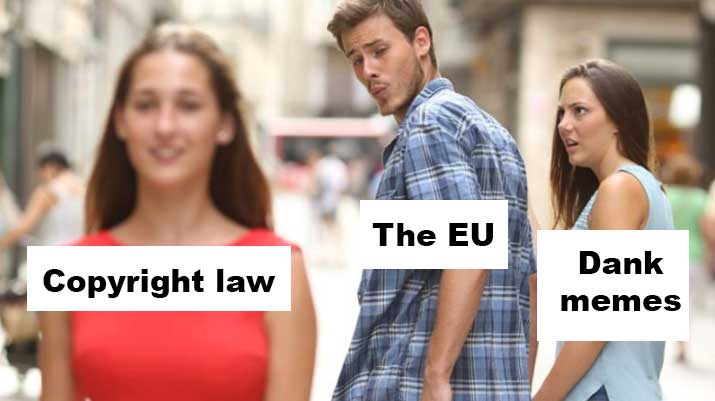EU backs copyright law ‘which could ban memes’ and change the internet forever

European Union officials voted for a copyright law which publishers hope will force companies such as Google to share revenues with creators – but others fear may have a chilling impact on creativity.
The European Commission, which began the debate two years ago, say the new laws are necessary to level the playing field between online platforms and publishers, broadcasters and artists.
But privacy groups claim that the new law could put a stop to remixes and memes.
The vote saw 438 in favour while 226 were against, with 39 abstentions – a final vote is expected next year after negotiations with the Commission and EU countries.

The move was welcomed by creative groups such as Federation of European Film Directors (FERA), but technology companies were less enthused.
Google’s chief business officer, Philipp Schindler said, ‘It’s bad for creators, for entrepreneurs and for innovators.’
Privacy activists claim that articles within the new law effectively mean that ‘user-generated content’ (including memes, text audio and video) have to be screened by platforms such as Google to see if they violate copyright.
That means that things such as memes – which use pictures from films and comics – would be in violation of the law.
Musicians have also warned that it could spell an end to DIY remixes.
Privacy group the Electronic Frontier Foundation posted a letter signed by 70 internet experts including inventor of the World Wide Web Tim Berners-Lee and Wikipedia founder Jimmy Wale warning of the dangers of the law.
The EFF letter said, ‘By requiring Internet platforms to perform automatic filtering all of the content that their users upload, Article 13 takes an unprecedented step towards the transformation of the Internet, from an open platform for sharing and innovation, into a tool for the automated surveillance and control of its users.’
In case you’re wondering: the #EU just voted to impose filters on all the text, audio, photos, videos, etc you might post. If you think this will help photographers or other creators, you don’t understand filters.
— son of an asylum seeker, father of an immigrant (@doctorow) 12 September 2018


